Bishop Edward Daly: '˜He was a man of wonderful ideas'
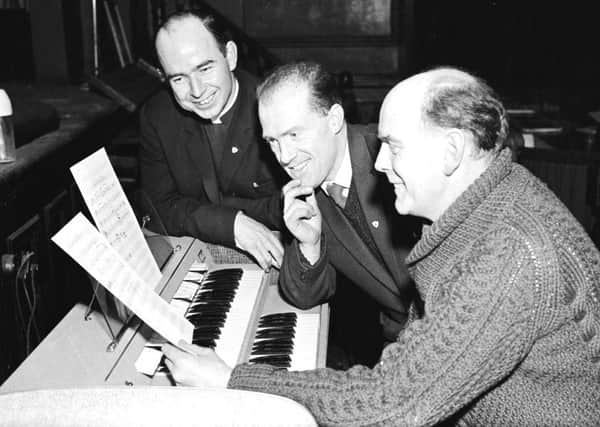

Pat MacCafferty, son of James MacCafferty, another legendary Derry figure, told the ‘Journal’ that his father and the late Bishop become very close friends during their lifetime. Bishop Daly will be laid to rest in the grounds of his beloved St Eugene’s Cathedral following his Requiem Mass this afternoon.
On his arrival in Derry as a curate in 1962, the then Fr Daly was tasked by Bishop Farren to revitalise St Columb’s Hall.
Advertisement
Hide AdAdvertisement
Hide AdIn a chapter of his book ‘Mister are you are priest?’called ‘No Business Like Show Business’ Bishop Daly himself explained the circumstances behind been given the task at hand.
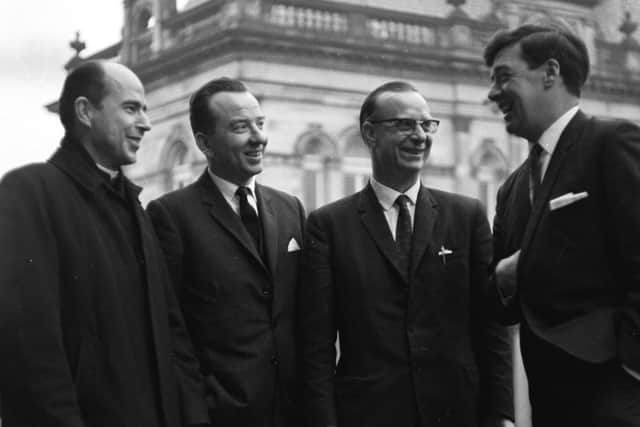

He wrote: “About two months after arriving in St Eugene’s, Bishop Farren asked me to take over the administration of St Columb’s Hall, in addition to my other parish duties. St Columb’s Hall was a substantial building near the city centre, built in the 1880s by the Catholic people of Derry. It consisted of a large auditorium seating about 1,000 people, a smaller, Minor Hall and various other rooms and facilities. The large hall had been used as a cinema since the 1920s, but in the early 1960s the movies were having a bad time. The new phenomenon of television had drastically reduced the numbers attending the cinema. Besides, it was proving difficult to get first run films when competing with big multi-national cinema chains. St Columb’s Hall had closed as a cinema a few months before I came to Derry. It cost a lot merely to maintain the fabric of the building. Bishop Farren asked me to organise functions there and try to keep it viable. He told me he had heard about my activities in this field in Castlederg.
“This request was to give an added dimension of enjoyment my years in Derry. St Columb’s Hall provided a completely different challenge to St Patrick’s Hall in Castlederg. It was much bigger, a theatre rather than a dance hall and an urban environment rather than a rural environment. The activities therefore afforded a welcome counter-balance to the often harsh realities of pastoral ministry in the Bogside.
“The building had been neglected for many years but it was a beautiful old building and it had great potential. Some activities had to be devised that would attract audiences, despite the counter attraction of television. I talked to a number of people and sought advice on how we could bring St Columb’s Hall back to life. Among those I talked to were James MacCafferty and Donald O’Doherty. James was a singing teacher, a superb pianist and accompanist, choral arranger and musical genius. He taught singing to many generations of Derry children and adults and was greatly respected in the city. Donald had been associated with entertainment in Derry for many years. I also consulted with other people and drew from my experience in Castlederg.”
Advertisement
Hide AdAdvertisement
Hide AdPat MacCafferty told the ‘Journal’: “If he had not been a priest, Bishop Daly would have been an impresario. Few people know he was within a couple of weeks of getting The Beatles to play at St Columb’s Hall. He had been in contact with Brian Epstein. But, they went to Number 1 in the charts and then they weren’t coming to play in St Columb’s Hall.
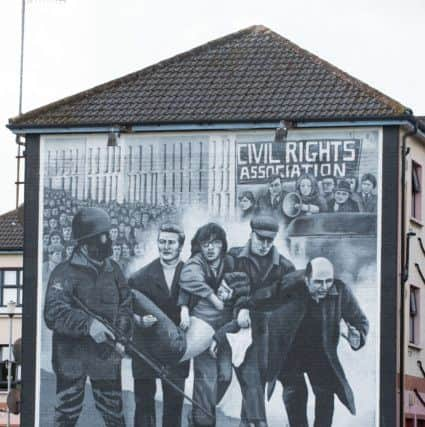

“He was a very forward thinking man. He wasn’t afraid to spend money in order to make it.
“Before Bishop Daly’s concerts the normal format was that all of the featured artists would have been from around the North West. He revolutionised that and brought in top acts from Ireland, Britain and America.”
In his book Bishop Daly explained: “In October 1962, a series of Sunday-night concerts was initiated, which continued over the next eight years. Considerable investment was made in stage lighting and sound systems and other equipment that would enhance the optimum presentation. James MacCafferty was resident musical director, Donald O’Doherty was resident compere and Frank Carson, a young man from Belfast, was the resident comedian. Frank was booked for three shows and stayed for six or seven seasons! We also had a resident chorus and small orchestra directed by James. The concerts featured some of the biggest names in show business at that time. We had American and British entertainers as well as almost all the leading Irish performers of the time. People like Jim reeves and Roy Orbison, Milo O’Shea and The Dubliners, The Seekers from Australia and Moira Anderson from Scotland, Val Doonican, the Clancy Brothers and Tommy Makam, classical singers like John Holmes from the Sadlers Wells Opera were all featured. We catered for a wide range of tastes. The big show on Television at that time was Sunday Night at the London palladium. Our concerts began at the same time, eight o’clock on Sunday evening, had an unashamedly similar format and, on more than one occasion, the star who topped the bill in the television show on one Sunday, topped the bill in Derry on a subsequent Sunday.
Advertisement
Hide AdAdvertisement
Hide Ad“I learned that many of the big name artistes were free and anxious to have bookings on Sunday nights. It was the age of the Beatles and a very exciting time in the history of popular music and entertainment. I had an excellent agent in London who booked artistes for me and he managed to get some wonderful performers to come to Derry. Several of the artistes became my personal friends. The inclusion of Derry or North West performers on every bill was a policy that always adhered to. I believed it offered good experience for promising young artists to appear on the same bill as big established stars. At the very first concert in October 1962, Phil Coulter, a young Derry pianist, appeared down the bill as a supporting act. It was one of his first ever concert appearances. Dana also performed on several occasions as a child and teenager in the Sunday night concerts. There were fifteen to twenty of these concerts each winter. After the first series, season tickets were introduced, and more than seven hundred season tickets were made available and sold for each of the subsequent series.”
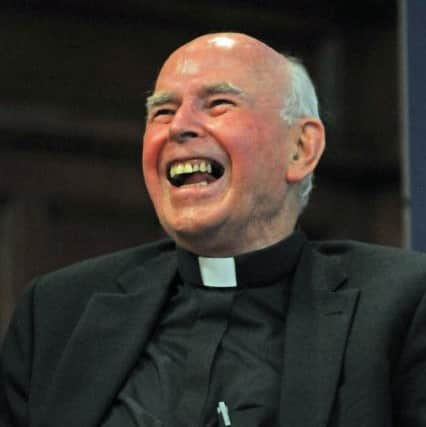

The formula was undoubtedly a highly successful one. It was accompanied by the introduction of Bingo by Bishop Daly on a previously unseen scale as well. And, it was something that he encountered criticism for.
He said: “The more glitzy presentation of this much-slandered pastime had not reached Derry. I borrowed a few ideas on presentation from elsewhere and launched Bingo in Derry in September, 1962. I was completely stunned by the response. With a few weeks, the main auditorium in St Columb’s Hall was unable to accommodate the crowds and within a couple of months, every available space in every room in the building was occupied on two nights a week. The attendances were regularly in excess of 2,000 people. Little old ladies who had not been out for years attended, with their hair newly done. People dressed up for the occasion-men and women, young and old; they came from the Bogside and the Waterside and from outside the city, Protestant and Catholic. This continued for years.
Twenty years later, someone who was castigating me about something or other, was running out of ideas and incentive and then made the ultimate allegation, ‘Aye, and it was you who introduced Bingo to Derry and nearly wrecked he town!’ People often criticise Bingo but they are usually people who have never played it or attended a Bingo session. In the 1960s, it certainly gave people in Derry an opportunity to get out of their homes and offered them a social outlet. They enjoyed themselves. They made new friends. There was a good package on offer. As well as the game, there was some good live musical entertainment and it constituted for many a relaxing and enjoyable night out at relatively small cost. Besides, there was always the possibility of winning something. I did not witness much overspending. Most of the people who attended were conservative and prudent in their expenditure. Like everything else, people can abuse it. But on the whole, Bingo is a relatively harmless and pleasant pastime that a lot of people enjoy and many charities have hugely benefitted from it.”
Advertisement
Hide AdAdvertisement
Hide AdHowever, popular music and bingo was not the height of Bishop Daly’s cultural outlook. He instigated the Colmcille Ladies Choir, was a driving force behind the highly successful drama group the ’71 Players and according to Pat MacCafferty also planted the seed in James MacCafferty’s head to form the famed MacCafferty Singers.
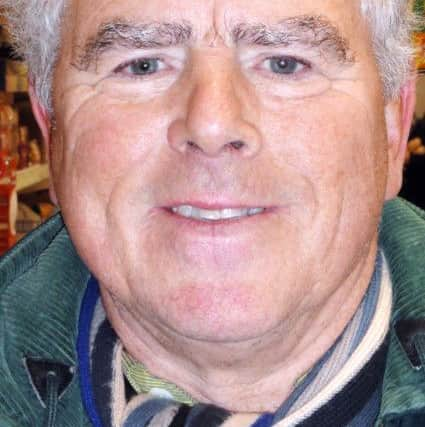

Another offshoot of Bishop Daly’s development of talent was the introduction of the still renowned St Columb’s Hall pantomimes-something which Pat McCafferty recalled almost caused a highly unintentional scandal!
“When my father died Bishop Daly in his eulogy of him said that they couldn’t find any sheet music for panto’s in Ireland so they decided to go to London. Of course all the music stores are in Soho. Downstairs were the places designed for ‘other business’ as it were and upstairs were the music stores. Bishop Daly said to my father ‘James, if anyone sees us coming out of here, we are in big trouble!’”, said Pat.
Down the decades Bishop Daly was an utterly familiar sight during Easter Week at Feis Dhoire Cholmcille-an event to which the MacCafferty family are inextricably linked.
Advertisement
Hide AdAdvertisement
Hide Ad“He had an undivided loyalty to the feis. He had a wonderful sense of what Derry could produce. I interviewed him in St Columb’s Hall in 2013 for TnaG on how the Fleadh would go down in Derry. He explained that without Derry Feis that the Fleadh would never have come here beciase it was the bedrick upon which traditional culture was formed in the city. He also explained what St Columb’s Hall actually meant to people in Derry.
“But, his support for Feis Dhoire Cholmcille was unbelievable. He could see the special talents that would go on to be great stars but more than anything, and this is what the feis is truly about, is that all the children and young adults that take part, through music, drama and dance they could create their own unique sense of identity and learn skills that would stand to them in later life.
“He was a very modest and quiet man despite all his associations to show business and of course being thrown into the spotlight because of Bloody Sunday. But, he never lost touch with the ordinary people. He had a special gift to be able to relate to the biggest and the smallest in the town.
“It’s very sad that he’s gone. Simply, as a man he will be greatly missed. He might have been born in Beleek, but he was a Derryman. He’ll never be forgotten by the people of Derry.”